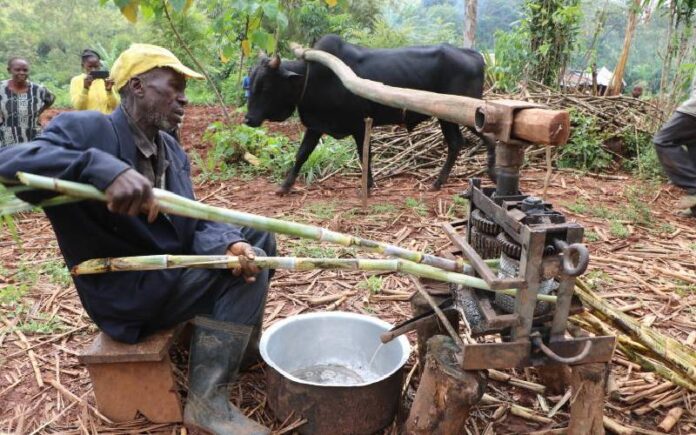In the quiet village of Imamune, nestled within the Ikolomani sub-county of Kenya, Mathias Machika has become a local legend for his unique and industrious approach to making jaggery. His story is a testament to human ingenuity and resilience in the face of adversity.
Mathias Machika’s journey into jaggery making began as a response to the challenges faced by local sugar factories. Like many residents of Kakamega, he used to grow sugarcane. However, when local sugar factories began experiencing problems, he found himself unable to sell his crop. Faced with this dilemma, he embarked on a remarkable journey of entrepreneurship.
Instead of allowing his sugarcane crop to rot, Machika devised a method to salvage it. He employed a giant bull, tied to a wooden plank, to harness the power of these gentle creatures to move a sugarcane crusher in a circular motion. This manual process, though labor-intensive, yielded surprising results. People from neighboring areas flocked to buy the jaggery he produced.
Machika’s jaggery-making process involves several stages. First, he extracts sugarcane juice by feeding the cane into two circular aluminum cylinders mounted on a metallic frame. The juice is collected in a large aluminum sufuria strategically placed beneath the grinder. The leftover cane waste is dried in the sun and used as firewood. Once the juice is collected, it is heated for 30 minutes, concentrating the liquid. After cooling for at least 10 minutes, the liquid solidifies into jaggery bars, ready for packaging and sale.
This venture has not only sustained Machika and his family for over a decade but has also provided employment opportunities for others in the community. He employs seven people who assist in various stages of the jaggery-making process, from cutting cane on the farm to heating the juice and packaging the jaggery bars.
Despite facing challenges such as the scarcity of raw materials and high prices demanded by some sugarcane farmers, Machika’s resilience and dedication shine through. He takes pride in the fact that his venture not only supports his family but also empowers his community economically.
Furthermore, his business model extends beyond his own jaggery production. He rents out his manual cane grinder to individuals who wish to try their hand at jaggery production, further contributing to the local economy.
Mathias Machika’s jaggery serves not only as a delicious sweetener but also as a product with medicinal value and health benefits, attracting customers from neighboring regions. It is used as a natural alternative to refined sugar in beverages and incorporated into various traditional brews.
In Imamune, Mathias Machika is more than a jaggery maker; he is a symbol of resilience, entrepreneurship, and community empowerment.

